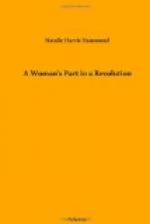for the asylum the prison door afforded them from
their merciless pursuers. They were quickly locked
into cells. For many hours they had not tasted
food. The first Reformers imprisoned slipped in
to them a part of their own provisions, but as it
was quickly and stealthily done one cell would receive
the pannikin of meat, another the tin of potatoes,
&c. The cells were in a filthy condition.
As has been truly said, a Boer prison is not built
for gentlemen. It was an unavoidable misfortune
that this prison, which had up to this time housed
only refractory Kaffirs, should by force of circumstance
become the domicile for six long dreary months, and
through a hot tropical summer, of gentlemen nurtured
in every decency. Captain Mein told me that he
stood the greater part of that first night rather than
sit upon the filthy floor, but exhaustion at length
conquered his repugnance. These were times which
proved men’s natures. It distilled the
very essence of a man, and if anywhere in his make-up
was the salt of selfishness, it was pretty sure to
appear. Many who before had appreciated Charlie
Butter’s open hospitality, realised now that
it was more than kindliness which prompted him to
give up his last swallow of whisky to a man who was
older or weaker than himself. And they tell me
that my own good man’s cheery spirits helped
along many a fellow of more biliary temperament.
The four leaders were put into a cell 11 feet by 11
feet, which was closed in by an inner court.
There was no window, only a narrow grille over the
door. The floor was of earth and overrun by vermin.
Of the four canvas cots two were blood-stained, and
all hideously dirty. They were locked in at 6
o’clock—one of them ill with dysentery—and
there they remained sweltering and gasping through
the tropical night until six of the morning.
For two weeks they remained in this cell. Meanwhile,
I knew nothing of my husband’s plight, being
mercifully deceived by both him and our friends, every
day Mr. Heath bringing to Parktown telegrams from
my husband assuring me of his good treatment by the
Government, and imploring me not to worry.
The Reform Committee consisted of seventy-eight members;
sixty-four were arrested. One of this number
subsequently committed suicide in a temporary fit
of insanity caused by protracted anxiety and prison
hardship.
The Committee was composed of men of many nationalities
and various professions—lawyers, doctors,
and, with only one or two exceptions, all the leading
mining men on the Rand. The Young Men’s
Christian Association was well represented, and a
Sunday-school Superintendent was one of the list.
I returned to my home, and was in the doctor’s
care, and attended by a professional nurse.




